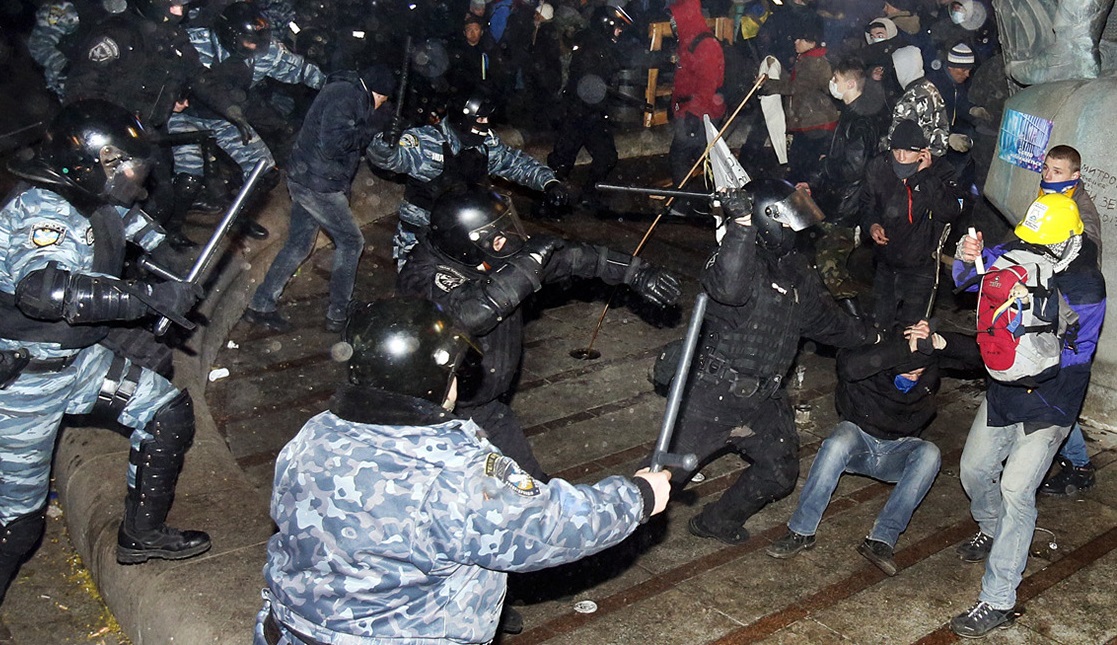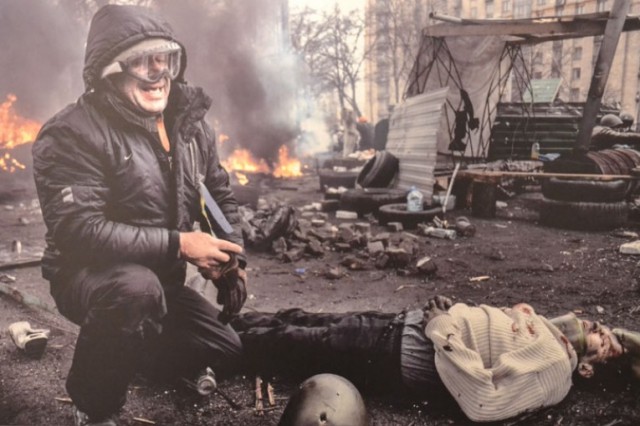In the latest appointment which brings closer the revenge of the pre-Euromaidan ancien regime, President Zelenskyy has appointed to a top post in the President's Office a Yanukovych-era police chief who approved of the crackdown on Euromaidan protesters in 2013-2014.
The official is Oleh Tatarov, and he has been appointed to the post of the Deputy Head of the President's Office. Tatarov told Interfax-Ukraine that he would be involved in shaping state policy in the field of law enforcement, providing national security guarantees in the areas of law enforcement, combating corruption, and protecting human rights.
Tatarov covered up police attacks on Euromaidan protesters
These plans appear to be cynical to the extreme, given that during the Euromaidan Revolution, the newly-appointed official held the post of the Head of the Main Investigation Department of the Ministry of Internal Affairs during the anti-Yanukovych protests which ended in protesters being massacred by snipers.
His appointment received pushback from representatives of human rights organizations.
The NGOs call upon President Zelenskyy "to dismiss Oleg Tatarov from the post of Deputy Head of the Office of the President of Ukraine and not to allow appointments to responsible political positions of those who justified and covered mass crimes and human rights violations and embody Yanukovych's authoritarian regime, as they held positions in law enforcement agencies of the time."
The statement recalls that at the height of the crackdown of law enforcers on Euromaidan protesters, Oleg Tatarov spread lies alleging that it were the protesters who attacked the police, not the other way around.
Particularly, on the night of 23 January 2014, 15 members of the Automaidan, the "cavalry" of the Euromaidan movement which was patrolling the 17th Kyiv hospital so that wounded protesters admitted there would not be kidnapped by government forces, was attacked by the Berkut riot police. In a major blow against the Euromaidan movement, their cars were destroyed and the leaders of the movement were beaten and arrested.

Euromaidan Press covered this here and here. Tatarov, however, claimed that it were the Automaidan members who, in an act of "hooliganism and riots," "chased four buses of the Berkut" that night and "tried to inflict bodily injuries on them," whitewashing the brutal actions of the Ukrainian law enforcers at meetings with diplomats and foreign officials
Yevheniya Zakrevska, a lawyer protecting the interests of families of slain Euromaidan protesters, noted that the lies spread by Tatarov legitimize the brutal beating, torture, and destruction of protesters' cars during a special operation planned by and involving the Berkut riot police, criminal police, paid thugs, the management the Kyiv head office and the Ministry of Internal Affairs.

"In addition, during Yanukovych's time, Tatarov, as deputy head of the Main Investigation Department of the Ministry of Internal Affairs of Ukraine, repeatedly publicly stated that the police were not involved in the violence and killings that took place during the Euromaidan. In particular, he stated that the police did not use firearms against the protesters, and the nature of the injuries of some of those killed may indicate that they were shot by the protesters themselves," the statement says.
Serhiy Horbatiuk, a prosecutor who led the investigation into crimes committed during Euromaidan, told Hromadske that Tatarov as a manager of the Ministry of Internal Affairs was responsible for covering up the crimes.
The Berkut riot police gave false testimonies regarding the protesters they had beaten; the investigation led by Horbatiuk determined that their attack was coordinated from above, but there were no official documents - the criminal orders were issued verbally. The investigation of these cases faced the most resistance because of the mutual cover-up actions of the investigator, prosecutor, and judge, Horbatiuk said. However, Tatarov was not officially incriminated.
"There are reasons to speak of [Tatarov's] participation [in the crimes], but at that time there was no notice of suspicion," Horbatiuk stated.
Meanwhile, participants of the Euromaidan protests say that Zelenskyy's appointment of Tatarov sends a very clear signal:
"Tatarov was probably appointed deliberately, to reverse the achievements of the [Euromaidan] Revolution of Dignity, to humiliate the people fighting for Ukraine's independence. And to intimidate them. [Which is] nothing surprising or unpredictable," noted Ustym Holodnyuk, the father of a Euromaidan protester killed in the standoff with the police.
Pavlo Sydorenko, the coordinator of an initiative group advocating for justice for protesters maimed and killed by the police, who himself lost an eye from a rubber bullet back in those days, told DW that
"[Tatarov's appointment] is a slap in the face not only to Euromaidan protesters who suffered at the hands of the law enforcement but also to those millions of Ukrainians who came out into the streets, protesting against the impunity of the authorities."
Not the first controversial official appointed to a high position
Zelenksyy's presidency has been marked by a row of controversial appointments: Oleksandr Babikov, lawyer of ex-President Yanukovych incriminated by Ukraine with state treason, was appointed as deputy head of State Bureau of Investigations. Former Head of Zelenskyy's Presidential Office Andriy Bohdan was appointed in violation of the law on lustration, among other officials.
Andriy Yermak, the Head of the President's Office to whom Tatarov is appointed as a deputy, is a controversial figure himself: he is suspected of having business connections with senior Russian government officials.
Moreover, Tatarov's appointment appears to contravene Ukrainian legislation on the lustration of officials who occupied crucial posts during the presidency of disgraced ex-President Yanukovych. As Tatarov held a key position in law enforcement from 2011 to 2014, he is prohibited from holding senior positions in the civil service.
Tatarov left his position after being lustrated in 2014, but attempted to re-enter the civil service. He was a candidate for deputy head of the Kherson Oblast Administration and deputy to controversial Prosecutor General Iryna Venediktova accused of politically motivated persecution, but these plans were abandoned over public concerns.
Until 2017, Tatarov headed the legal department of the Ukrbud corporation, in parallel being engaged in private law practice in which he defended scandalous and controversial figures.
The latter include being a lawyer for ex-head of the Appeals Court of Crimea Valeriy Chernobuk, who Ukraine suspects of state treason for defecting to Russia and calling upon Crimean judges to take up Russian citizenship after the occupation of the peninsula in 2014, Deputy Head of Yanukovych's Administration Andriy Portnov, whom he assisted in threatening to jail the prosecutor in his case, Ukrbud director Oleg Maiboroda, who was accused of embezzling funds during the construction of apartments for army servicemen, and pro-Russian oligarch Vadym Novynskyi who was suspected in helping Yanukovych seize power in the Ukrainian Orthodox Church of the Moscow Patriarchate by replacing the inconvenient Metropolitan Volodymyr with a figure more loyal to himself and Russia.
His appointment is "a dubious and risky decision," believes Volodymyr Fesenko, head of the Center for Applied Political Studies. Nevertheless, Fesenko believes that Zelenskyy is being motivated not by political preferences for the Yanukovych regime, but a desire for experienced staff. According to Fesenko, after coming to power, Zelenskyy appointed only newcomers who had not been in power either in Poroshenko's time or Yanukovych's time, in line with his electoral promises to do away with hated "old system" politicians.
However, the "new faces" were not always effective, and Zelenskyy's logic of appointments changed - he started strengthening his team with functionaries who worked during Poroshenko's and Yanukovych's time.
"There are no political preferences here. The stereotype that Yanukovych's people are returning isn't corroborated by the appointing principles. The Finance Minister, people in the defense block are from Poroshenko's team. This is also being criticized. [Probably], somebody recommended an 'effective manager', most likely - Yermak," Fesenko said.
Zelenskyy commented on the appointment of Tatarov during a press conference, saying that he doesn't think it's "fair" to consider anyone who held a top position in Yanukovych's time as the "old authorities."
"The most important thing is for the person to be honest. I think now that in our country, to change Ukraine, the moral side is most important, this is what many MPs are lacking," he said.
Read also:
- Ukraine’s new government: more oligarchic, more pro-Russian
- Fears of a pro-Russian turn as Yermak appointed new head of Ukrainian President’s Office
- Zelenskyy’s first appointments: Kolomoiskyi’s lawyer, cronies, experts
- Ukraine moves one step closer to jailing its former president; his supporters bring on the caricatures





